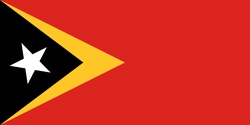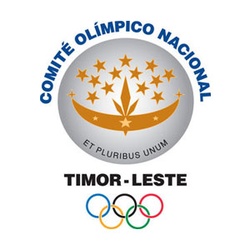Democratic Republic of Timor-Leste otherwise known as East Timor meaning Unity, Action, Progress is Located in Southeastern Asia at the eastern end of the Indonesian archipelago.
The capital city is Dili , Due to the poor economy, thanks in part to war and an unfortunate choice of crops grown, the government hopes to attract tourists to the region.
With a vast array of geographical features on the island there is plenty there to appeal.
From dolphin and whale watching in the waters around Timor-Leste near the capital Dili to climbing Mount Ramelau, the largest mountain in Timor-Leste reaching 2.9km at the highest point.
The area also has multiple locations for scuba diving in its coral reefs.
Timor-Leste exports coffee, sandalwood and marble. However the government hopes to expand offshore oil production to help boost the economy.
Timor Leste
About Timor Leste

National Olympic Committee

Sports
Relatively new to the international sporting scene, Timor-Leste entered the 2000 Sydney Summer Olympics with a four person team as Independent Olympic Athletes.
In the 2004 Athens Summer Olympics they entered a two person team and although they did not win any medals it was the first formal entry of Timor-Leste in the competition.
Competing in the 2003 Vietnam Southeast Asian Games for the first time the nation did not receive any medals, however returning in the 2005 Philippines Southeast Asian Games they received three bronze medals in the Arnis tournament.
After joining FIFA in 2005, Timor-Leste went on to pick up their first international points in 2008 with a 2-2 draw against Cambodia.
Climate
An area of natural beauty the island is home to many caves, valleys and mountains as well as vast forests and important coral reefs.
The climate is tropical with distinct wet and dry seasons.
The majority of rain falls between December to March with an average annual rainfall of over 75 inches.
The temperature remains relatively stable all year round at around 35 °C.
Religion
Roman Catholic with 98% of the population following the faith
Culture
East Timorese culture is also largely influenced by the occupation, with a lot of the architecture, particularly in the the port of Dili featuring a Portuguese slant.
There is a diverse range of Wildlife in East Timor, this includes the cuscus (a species of marsupial), monkeys, deer, civet cats, snakes, and crocodiles.
Agriculture is the mainstay of the economy and has a huge impact on the culture of the country, the chief products include copra, hides, coffee, cotton, rice, wheat, tobacco, wool, potatoes, and corn (maize), as well as pearls and sandalwood.
It is these products alongside Soap, perfumes, processed food, chemicals, and machine goods are what dominate and run the economy.
Traditional crafts include pottery, wood and ivory carving reflecting the traditional cultural values, plaiting, coir production, and basket making.
